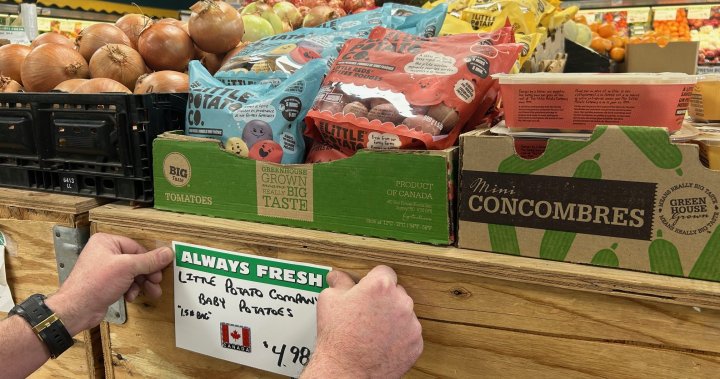Canada
Grocery stores help shoppers buy local but expert says U.S. boycott likely won’t last

A Growing Wave of Patriotic Shopping: Understanding the Shift in Consumer Behavior
Local Pride Takes Center Stage at Lakeview Market
In the heart of Kelowna, B.C., a small, family-owned grocery store, Lakeview Market, has taken a bold step to address a growing curiosity among its customers. For decades, the store has proudly sourced many of its products locally, a practice that reflects its commitment to supporting Canadian businesses. However, in recent months, customers have been increasingly inquisitive about the origins of the products they buy. To make it easier for shoppers to identify Canadian-made goods, the store’s co-owner, Barb Hill, decided to introduce Canadian flag stickers on locally sourced products. This simple yet effective initiative not only highlights the store’s dedication to buying local but also resonates with a broader movement sweeping the nation.
The Emotional Drive Behind Patriotic Purchases
The surge in patriotic shopping is not just about practicality; it’s deeply emotional. According to Dr. Sylvain Charlebois, director of the Agri-Food Analytics Lab at Dalhousie University, the current wave of support for Canadian products is largely driven by feelings of insult and anger. Canadians are reacting to the looming threat of U.S. tariffs, which could impose as much as a 25% tax on many Canadian goods entering the United States. This economic uncertainty has sparked a sense of national pride, encouraging consumers to rally behind Canadian businesses.
Dr. Charlebois draws a compelling parallel to Mexico’s experience during the controversy over the U.S.-Mexico border wall. When former President Donald Trump proposed that Mexico pay for the wall, it became a defining moment for Mexican nationalism. Similarly, Charlebois suggests that Canadians are now experiencing their own “51st state moment,” a term that evokes a sense of vulnerability and solidarity. This emotional response is manifesting in a collective effort to support Canadian-made products, as consumers seek to assert their independence and resilience in the face of external pressures.
The Role of Grocery Stores in Shaping Consumer Choices
Grocery stores across Canada are play ing a crucial role in this patriotic push. Many are taking steps to help customers identify Canadian-made products, whether through labels, stickers, or special displays. Lakeview Market’s use of Canadian flag stickers is just one example of how retailers are responding to the growing demand for transparency and nationalism in shopping choices. By making it easier for consumers to identify Canadian products, these stores are not only meeting customer expectations but also reinforcing a sense of community and shared purpose.
However, Dr. Charlebois cautions that this wave of patriotic purchasing may not last forever. While emotional events can trigger strong reactions, economic realities often prevail in the long run. Consumers are ultimately driven by value and affordability, and many Canadian products may not always be the most cost-effective option. As the initial wave of nationalism fades, shoppers may return to their usual habits, prioritizing price over country of origin.
The Importance of Awareness in the Grocery Aisle
Despite the potential for this trend to be short-lived, many argue that the current focus on Canadian-made products serves an important purpose. Barb Hill, for instance, sees this movement as an opportunity to raise awareness about the importance of knowing where our groceries come from. In an increasingly globalized world, it’s easy to lose sight of the impact our purchasing decisions have on local economies and communities. By encouraging consumers to think more critically about their choices, this patriotic push is fostering a greater sense of responsibility and connection to the products we buy.
Moreover, this movement highlights the interconnectedness of trade and diplomacy. The looming threat of U.S. tariffs has reminded Canadians of the delicate balance of international trade relationships and the potential consequences of geopolitical tensions. As shoppers make more informed choices, they are also contributing to a broader conversation about the value of supporting domestic industries and the importance of economic sovereignty.
Balancing Patriotism with Practicality: The Way Forward
As Canada navigates this moment of heightened patriotism, it’s important to strike a balance between supporting local businesses and recognizing the practical realities of global trade. While the current emphasis on Canadian-made products is a powerful expression of national pride, it’s also crucial to acknowledge the complexities of the modern economy. Many products, especially in the food sector, rely on international supply chains that cannot be easily replicated within national borders.
This doesn’t mean that efforts to support Canadian businesses are futile. On the contrary, initiatives like Lakeview Market’s use of Canadian flag stickers demonstrate the potential for grassroots movements to make a meaningful impact. However, as consumers, we must remain realistic about the limitations of patriotic shopping and advocate for policies that support fair trade and robust domestic industries. By fostering a deeper understanding of the economic and emotional factors driving our choices, we can create a more sustainable and equitable future for Canadian businesses and consumers alike.